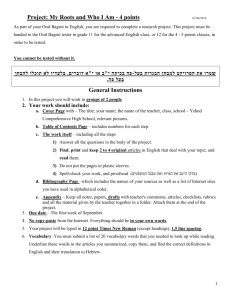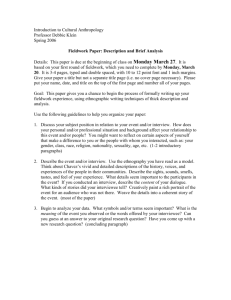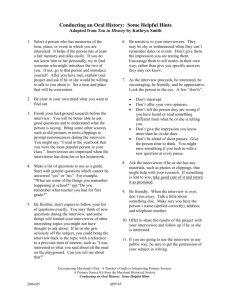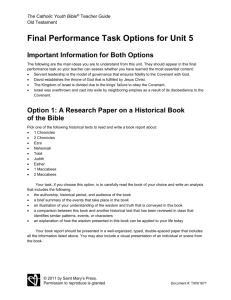Projects: My Roots and Who I Am
advertisement
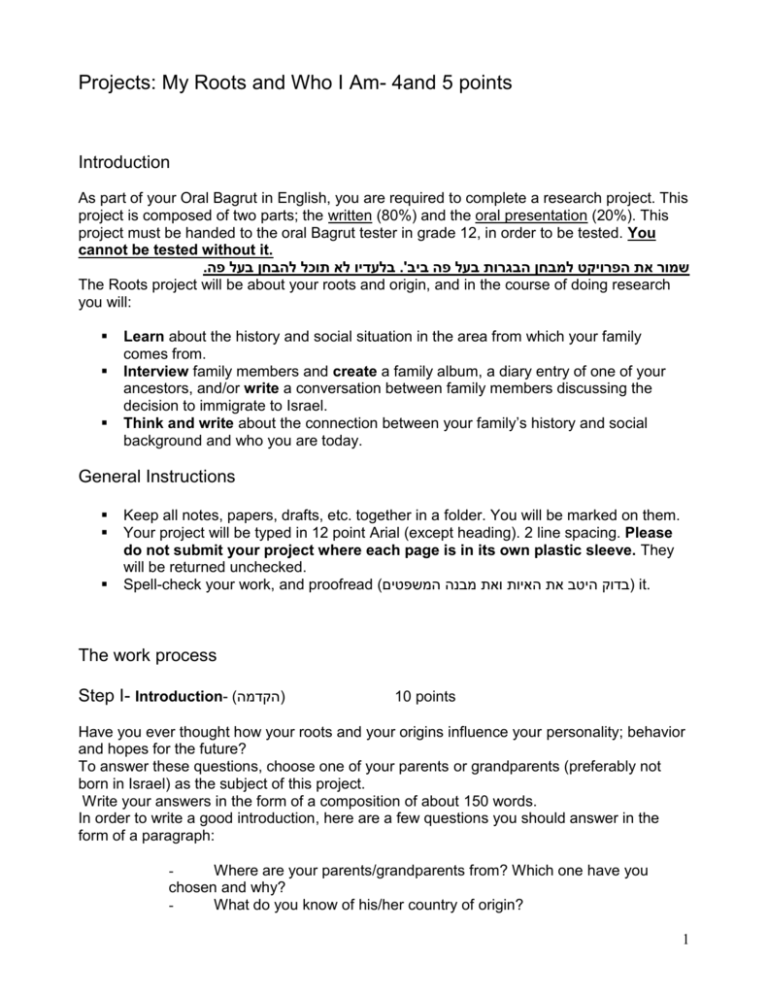
Projects: My Roots and Who I Am- 4and 5 points Introduction As part of your Oral Bagrut in English, you are required to complete a research project. This project is composed of two parts; the written (80%) and the oral presentation (20%). This project must be handed to the oral Bagrut tester in grade 12, in order to be tested. You cannot be tested without it. . בלעדיו לא תוכל להבחן בעל פה.'שמור את הפרויקט למבחן הבגרות בעל פה ביב The Roots project will be about your roots and origin, and in the course of doing research you will: Learn about the history and social situation in the area from which your family comes from. Interview family members and create a family album, a diary entry of one of your ancestors, and/or write a conversation between family members discussing the decision to immigrate to Israel. Think and write about the connection between your family’s history and social background and who you are today. General Instructions Keep all notes, papers, drafts, etc. together in a folder. You will be marked on them. Your project will be typed in 12 point Arial (except heading). 2 line spacing. Please do not submit your project where each page is in its own plastic sleeve. They will be returned unchecked. Spell-check your work, and proofread ( )בדוק היטב את האיות ואת מבנה המשפטיםit. The work process Step I- Introduction- ()הקדמה 10 points Have you ever thought how your roots and your origins influence your personality; behavior and hopes for the future? To answer these questions, choose one of your parents or grandparents (preferably not born in Israel) as the subject of this project. Write your answers in the form of a composition of about 150 words. In order to write a good introduction, here are a few questions you should answer in the form of a paragraph: Where are your parents/grandparents from? Which one have you chosen and why? What do you know of his/her country of origin? 1 What customs, beliefs, food, traditions, clothing, have you learned from that parent? What do you think about them? Which of these do you like or dislike and why? Why have you chosen this particular culture (background) to focus your project on? Step II- Background 15 points Read in Hebrew about the country you have chosen and its history. Then find information in English in one of the sites below. Choose 3 major towns/cities or important sites in this country. Find information about Jewish history in that country, food, culture, clothing, education. Save all the information you have found in a special file in the computer/ disk on key/ diskette. דיסק און קי/ בדיסק נשלף/ שמור את כל המידע והמאמרים שמצאת בתיקיה במחשב Useful sites: www.wikipedia.com www.wikipedia.co.il http://www.bh.org.il/Communities/index.aspx ( great site about Jewish communities) http://www.mindspring.com/~jaypsand/index.htm ( about Jews from Africa) http://photo.net/travel/israel/timeline http://www.infoplease.com http://www.answers.com http://pages.infinit.net/jackross/jt-history.htm http://www.fordham.edu/halsall/jewish/jewishsbook.html (many sites inside) Use the following points to write about your research. 1. Describe 3-4 important places in the country : towns/cities/villages in the country you are writing about. Describe where it is (centre, north, south, east, west) in the country. Add in which continent the country is. How old each place is. Why it is important (capital, industrial, historical, cultural importance, tourism) What you learned about the Jewish history in this country. You can add general information ( (מידע כלליabout the country. Describe in short the place your family came from. You can add pictures/map of the country. Find 3 types of food your family eats that came from this country. 2 Find 3 types of music, clothing or traditions your family has that came from this country. 1. In order to complete this task you must conduct a research based on at least 2-3 different sources of information. You must choose at least 7outof the 9 points from the above and summarize them separately. Write at least 100 words in each summary. You must hand in the summary and the articles you used together. .'חובה להגיש את הסיכומים ואת המאמרים ביחד בשלב א Later, the articles must be included in the drafts section of your project. 2. Work in groups if you share the same culture. In that case each one of you will summarize one article dealing with a different aspect of the chosen culture. .העתקה לא תתקבל.חובה לסכם את המאמרים במילים שלכם 3. Vocabulary. You must submit a list of 20 vocabulary words that you needed to look up while reading. Underline these words in the articles you summarized, copy them, and find the correct definitions in English and their translation to Hebrew. Step III – Immigration (Aliah) 10 points What or who influenced your ancestors (parents or grandparents) decision to leave for Israel? Use the following issues to write 2-3 paragraphs of about 150 words altogether: a. b. c. d. e. Who decided to immigrate? His/her reasons for immigrating. His/her reasons against immigrating. What problems did he/she have? How did he/she solve them? What do they think now about their decision? What do you think about it? Step IV-Family Album 5 points Create a family album of the person you are researching. You can add photos, documents, passport copies (if possible) and other details of his or her history. Go back at least 3 generations. Do not include original documents or pictures – instead, scan everything you include. . אלא בעותקים,אין להשתמש בתמונות ומסמכים מקוריים Step V- The Interview 10 points Devise a set of questions that you will then use to interview 1 family members (your researched parent / grandparent). In this way you will find out specific information about your family. Prepare at least 10 questions and answers – altogether no less than 150 words. 3 When you interview the person, remember that sometimes the person’s answer to a question may lead you to make up another one on the spot. Let the interview flow. New questions sometimes come right from the answers to previous questions. Be open to this. Remember to be patient and give the interviewee time to answer your questions. Be certain that you provide detailed, important relevant and interesting facts about the interviewee. Ask about the following: family’s life before immigration and nowadays (socio-economic status, education, careers, daily routine, culture, religious observances, holidays, customs and traditions, cuisine). You might want to compare life before and after the immigration. If your interviewee was born in Israel, find out information he/she knows about the member of their family who immigrated to Israel. Step VI- Diary Entry 10 points Create an imaginary diary entry of one of the family members right before/ during/ immediately after immigration. Be sure to include their situation, social status, education, professions, routines, customs, traditions, cuisine, etc. About 100 -150 words. Step VII- Reflection and Conclusion 15 points By now you must know quite a lot about your family. This part pulls together everything you have researched and written about in the project and focuses on the main idea of the project – how your roots shaped, influenced, and affected who you are, your identity, your family’s values, and your heritage. Write about the following: What is the connection between my family’s historical and social background and who I am today? How am I who I am because of who they were? For example: How did the cultural mix of a Turkish grandfather or a Greek grandmother affect the family? How has researching this project enriched my knowledge and awareness of my background and my connection to my family? Give examples. If you could change anything in your family's history, what would you change and why? Your essay must be at least 200 words. Bibliography 3 points Write a bibliography - be certain it is complete and accurate. It must be arranged alphabetically, according to author and the address of the site. Cover Page – 5 points The name of the project. The school’s name (Yehud Comprehensive High School). Your name/class. Your teacher’s name. Date the project was handed in. Table of contents 2 points 4 Step IX – Oral Presentation Prepare your oral presentation (Appendix 4- criteria for Oral Presentation) Present your project. (3 minutes) a. Introduce your project: 1. What the topic is 2. Why you chose to write about this particular culture/country. 3. What you learned while doing this project about the following: Doing a research project in English. About the topic, itself. Skills needed while doing a research project. 4. Did you know anything about the topic before you started working on it? b. Body of presentation: 1. What were the main issues that you researched with regard to your topic? 2. What did you learn about each issue? 3. What issues did you learn about from other members of your group? 4. Name two sources you used. 5. Where / how did you find your sources? c. Summary: 1. What is your opinion of your project? Did you do a good job? Why/why not? 2. What did you enjoy about it the most? 3. What aspect did you find the most difficult? 4. Is there anything you would change in the way you worked? 5. What else could you research / learn about your topic? 6. How did you present your project to your classmates? 5 Appendix 1 - Evaluating written tasks on the bagrut examination State of Israel Ministry of Education, Culture and Sport English Inspectorate Rubric for Assessing Written Presentation – Module D 2006 Criteria Content and Organization Descriptors information is relevant to the topic text is well organized content is easily understood text is written mostly in pupil's own words 30 Vocabulary some information is irrelevant to the topic text is fairly well organized content is sometimes difficult to follow chunks of the text are not written in pupil's own words 22 correct use of varied vocabulary appropriate word/idiom choice and usage use of appropriate register 20 7 correct use of appropriate vocabulary several errors of word/idiom form, choice and usage occasional use of inappropriate register 15 correct use of basic language structures hardly any errors of word order, connectors, pronouns, prepositions 40 15 information is irrelevant to the topic text is poorly organized content cannot be understood text is not written in pupil's own words. 10 limited or inappropriate vocabulary frequent errors of word/idiom form, choice and usage use of inappropriate register 5 occasional incorrect use of language structures several errors of word order, connectors, pronouns, prepositions 30 20 3 1 consistent incorrect use of language structures frequent errors of word order, connectors, pronouns, prepositions 10 5 Language Use Mechanics hardly any errors of spelling, punctuation, capitalization 10 Criteria several errors of spelling, punctuation, capitalization, run-ons 8 5 frequent errors of spelling, punctuation, capitalization, run-ons 2 1 Descriptors Teachers can give in-between grades e.g. 24 pts. If the format of presentation does not include all the required elements, deduct up to 3 points. TOTAL: ___ / 100 6 Appendix 2 - Table of Contents Pages 1. Introduction……………………………………..……1-3 2. Background a. culture b. political, c. etc.. d. 3. Immigration (Aliah) …………………………………0-0 4. Family Album 5. The Interview 6. Diary Entry 7. Reflection and Conclusion 8. Bibliography 7 Marking Checklist Item Content Vocabulary Spelling Grammar and Punctuation 1. Cover Page ( 5) 2. Table of Contents (2) 3. Total Points Per Item /10 Bibliography Page (3) 4. Step 1: Introduction 5. /10 Step 2: BackgroundIncludes: The articles, all drafts /15 –corrections. Vocabulary list. 6. Step 3: Immigration 7. Step 4: Family Album 8. Step 5: The Interview 9. Step 6: Diary Entry 10. Step /10 /5 /10 /10 VII- Reflection and /15 Conclusion 11. Step VIII- Your Oral Presentation 12. Total Grade: /20 100 8
